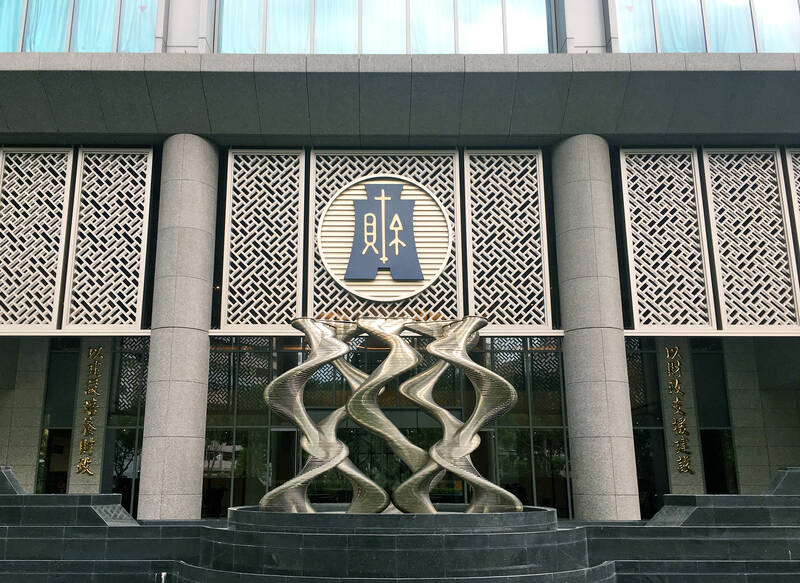Government tax revenue last month fell 13 percent annually to NT$176.7 billion (US$5.88 billion), as the Lunar New Year holiday shortened the number of working days and weighed on almost all tax categories, the Ministry of Finance said yesterday.
Securities transaction tax revenue fell 60.7 percent to NT$6.9 billion, the steepest fall since February 2009 during the height of the global financial crisis, mainly because the local bourse closed for nearly two weeks for the holiday, the ministry said.
Daily market turnover averaged NT$277.1 billion last month, dropping more than 20 percent from NT$348 billion for the same time last year, as investors stayed on the sidelines to avoid holiday shocks, the ministry said in its monthly report.

Photo: Clare Cheng, Taipei Times
Foreign capital inflows recovered after the holiday, but it remains to be seen whether the trend can be sustained amid global inflation and interest rate hikes by central banks, which is unfavorable for risky assets, the report said.
Revenue from land value tax plunged 52.1 percent year-on-year to NT$5.1 billion, as the number of taxable cases slumped 42.5 percent to 36,739, it said.
The ministry attributed the poor showing to fewer working days, interest rate hikes and unfavorable government policy.
Taichung recorded the steepest decline in tax revenue, followed by Taipei and New Taipei City, the ministry said.
Fewer working days also led to lower revenues from business tax, sales tax and corporate income tax, the report said.
Personal income tax revenue was the only exception, with a 1.3 percent increase, helped by interest incomes and corporate bonuses, it said.
The ministry also revised tax revenue for last year, when a surplus beat the government’s target by 19.2 percent, or NT$523.7 billion.
The government plans to share the windfall with the public by distributing NT$6,000 in cash to all Taiwanese and qualifying foreign residents.
Separately, a tax incentive program aimed at encouraging people to purchase energy-efficient appliances is to be extended by two years to June 14, 2025, the ministry said on Tuesday.
The program, introduced in 2019, offers tax breaks of NT$500 to NT$2,000 for purchases of refrigerators, dehumidifiers and air-conditioners that meet Level 1 or 2 energy-saving standards specified by the Bureau of Energy’s rating program.
The program was extended by two years in 2021 and was set to expire on June 14 before the latest extension, the ministry said.
As of Dec. 31 last year, tax rebates totaling NT$11.9 billion had been approved for purchases of 7.2 million energy-saving home appliances, government data showed.
Additional reporting by CNA

UNCERTAINTY: Innolux activated a stringent supply chain management mechanism, as it did during the COVID-19 pandemic, to ensure optimal inventory levels for customers Flat-panel display makers AUO Corp (友達) and Innolux Corp (群創) yesterday said that about 12 to 20 percent of their display business is at risk of potential US tariffs and that they would relocate production or shipment destinations to mitigate the levies’ effects. US tariffs would have a direct impact of US$200 million on AUO’s revenue, company chairman Paul Peng (彭雙浪) told reporters on the sidelines of the Touch Taiwan trade show in Taipei yesterday. That would make up about 12 percent of the company’s overall revenue. To cope with the tariff uncertainty, AUO plans to allocate its production to manufacturing facilities in

Taiwan will prioritize the development of silicon photonics by taking advantage of its strength in the semiconductor industry to build another shield to protect the local economy, National Development Council (NDC) Minister Paul Liu (劉鏡清) said yesterday. Speaking at a meeting of the legislature’s Economics Committee, Liu said Taiwan already has the artificial intelligence (AI) industry as a shield, after the semiconductor industry, to safeguard the country, and is looking at new unique fields to build more economic shields. While Taiwan will further strengthen its existing shields, over the longer term, the country is determined to focus on such potential segments as

TAKING STOCK: A Taiwanese cookware firm in Vietnam urged customers to assess inventory or place orders early so shipments can reach the US while tariffs are paused Taiwanese businesses in Vietnam are exploring alternatives after the White House imposed a 46 percent import duty on Vietnamese goods, following US President Donald Trump’s announcement of “reciprocal” tariffs on the US’ trading partners. Lo Shih-liang (羅世良), chairman of Brico Industry Co (裕茂工業), a Taiwanese company that manufactures cast iron cookware and stove components in Vietnam, said that more than 40 percent of his business was tied to the US market, describing the constant US policy shifts as an emotional roller coaster. “I work during the day and stay up all night watching the news. I’ve been following US news until 3am

COLLABORATION: Given Taiwan’s key position in global supply chains, the US firm is discussing strategies with local partners and clients to deal with global uncertainties Advanced Micro Devices Inc (AMD) yesterday said it is meeting with local ecosystem partners, including Taiwan Semiconductor Manufacturing Co (TSMC, 台積電), to discuss strategies, including long-term manufacturing, to navigate uncertainties such as US tariffs, as Taiwan occupies an important position in global supply chains. AMD chief executive officer Lisa Su (蘇姿丰) told reporters that Taiwan is an important part of the chip designer’s ecosystem and she is discussing with partners and customers in Taiwan to forge strong collaborations on different areas during this critical period. AMD has just become the first artificial-intelligence (AI) server chip customer of TSMC to utilize its advanced